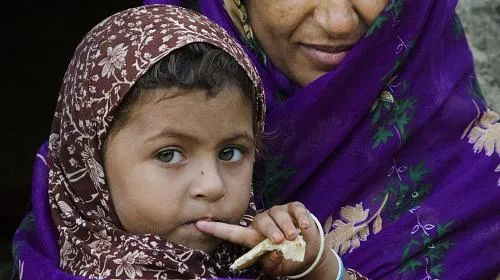WASHINGTON—Faced with an unprecedented global humanitarian crisis that is stretching aid agencies to the brink, a group of leading U.S. relief and advocacy organizations including CARE USA, International Rescue Committee, Mercy Corps, Oxfam America, Save the Children USA, U.S. Fund for UNICEF, World Food Program USA launched a coordinated effort to revamp the way the international system provides emergency and development relief. The U.S. Institute of Peace, an independent, national institute dedicated to managing conflict, also contributed to the report.
To launch the effort, the eight organizations issued a report, “A World at Risk: Humanitarian Response at A Crossroads,” which outlines a comprehensive set of recommendations that donor countries, host nations and aid organizations must take to address a scale of human suffering not seen since World War II.
“Having been driven from their homes by conflict and natural disasters, 60 million people across the globe are currently in dire need — and that number is only expected to grow,” says Oxfam America President Ray Offenheiser.”We must rethink how the humanitarian system can meet this rising need, working with local leaders, and helping communities become more resilient to the challenges they will inevitably face.”
The current humanitarian system is simply unable to meet the challenge of providing life’s basic needs—food, water, shelter—for the record number of people affected by conflict and disaster across the globe. Such widespread suffering fuels instability that transcends borders.
“This is one of the most significant challenges of our time. These conflict-driven crises not only cause enormous human suffering, but also pose a direct threat to global stability,” says Rick Leach, President and CEO of World Food Program USA. “The U.S. must continue to play a lead role, including mobilizing the rest of the world to address this challenge.”
The report outlines the need to find innovative ways to secure flexible and predictable funding, improve the link between emergency response and longer-term development efforts, boost the role of the private sector, including economic investments to spur job creation among refugee populations as well as host communities, increase local involvement, provide better support for refugee-hosting nations, and increase accountability and transparency among aid organizations.
“The steep increase in humanitarian crises is increasingly driven by protracted conflicts,” says Nancy Lindborg, President and CEO of the U.S. Institute of Peace. “We urgently need to rethink how we provide assistance as well as focus on getting ahead of these terrible cycles of conflict so we can shrink the need.”
The report also notes the new socioeconomic challenges created by these disasters, including the protracted nature of conflicts in Syria, Yemen, South Sudan and elsewhere and the increasing number of refugees who now live in urban settings instead of designated camps. The result is millions of people’s lives are being put on hold now that the average length of displacement stands at 17 years.
The organizations are working together to bring these recommendations directly to Members of Congress, the Administration and relevant financial institutions for in-depth, solution-oriented discussions. The recommendations are presented ahead of the World Humanitarian Summit in Istanbul in May as well as the upcoming UN General Assembly meetings this fall.
# # #
To download the report, please visit: www.wfpusa.org/humanitarianreport.
Media contact: Holly Frew hfrew@care.org +1.404.979.9389
About CARE: Founded in 1945, CARE is a leading humanitarian organization fighting global poverty. CARE has more than six decades of experience helping people prepare for disasters, providing lifesaving assistance when a crisis hits, and helping communities recover after the emergency has passed. CARE places special focus on women and children, who are often disproportionately affected by disasters. To learn more, visit www.care.org.

